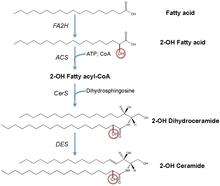FA2H
| View/Edit Human | View/Edit Mouse |
Fatty acid 2-hydroxylase is a protein that in humans is encoded by the FA2H gene.[3]
Function
This gene encodes a protein that catalyzes the synthesis of 2-hydroxysphingolipids, a subset of sphingolipids that contain 2-hydroxy fatty acids. Sphingolipids play roles in many cellular processes and their structural diversity arises from modification of the hydrophobic ceramide moiety, such as by 2-hydroxylation of the N-acyl chain, and the existence of many different head groups.[3]

Mechanism of 2-hydroxylated sphingolipid generation. Essentially they are generated like their non-hydroxylated counterparts. The only difference is that fatty acids are hydroxylated by fatty acid 2-hydroxylase (FA2H) before being incorporated into dihydroceramide by ceramide synthases (CerS).
Clinical significance
Mutations in this gene have been associated with leukodystrophy dysmyelinating with spastic paraparesis with or without dystonia[3] as well as fatty acid hydroxylase-associated neurodegeneration.[4]
References
- ↑ "Human PubMed Reference:".
- ↑ "Mouse PubMed Reference:".
- 1 2 3 "Entrez Gene: Fatty acid 2-hydroxylase". Retrieved 2011-12-30.
- ↑ Pierson TM, Simeonov DR, Sincan M, Adams DA, Markello T, Golas G, Fuentes-Fajardo K, Hansen NF, Cherukuri PF, Cruz P, Blackstone C, Tifft C, Boerkoel CF, Gahl WA (December 2011). "Exome sequencing and SNP analysis detect novel compound heterozygosity in fatty acid hydroxylase-associated neurodegeneration". Eur. J. Hum. Genet. 20 (4): 476–9. doi:10.1038/ejhg.2011.222. PMID 22146942.
Further reading
- Alderson, N. L.; Rembiesa, B. M.; Walla, M. D.; Bielawska, A.; Bielawski, J.; Hama, H. (2004). "The Human FA2H Gene Encodes a Fatty Acid 2-Hydroxylase". Journal of Biological Chemistry. 279 (47): 48562–48568. doi:10.1074/jbc.M406649200. PMID 15337768.
- Uchida, Y.; Hama, H.; Alderson, N. L.; Douangpanya, S.; Wang, Y.; Crumrine, D. A.; Elias, P. M.; Holleran, W. M. (2007). "Fatty Acid 2-Hydroxylase, Encoded by FA2H, Accounts for Differentiation-associated Increase in 2-OH Ceramides during Keratinocyte Differentiation". Journal of Biological Chemistry. 282 (18): 13211–13219. doi:10.1074/jbc.M611562200. PMID 17355976.
- Dick, K. J.; Al-Mjeni, R.; Baskir, W.; Koul, R.; Simpson, M. A.; Patton, M. A.; Raeburn, S.; Crosby, A. H. (2008). "A novel locus for an autosomal recessive hereditary spastic paraplegia (SPG35) maps to 16q21-q23". Neurology. 71 (4): 248–252. doi:10.1212/01.wnl.0000319610.29522.8a. PMID 18463364.
- Edvardson, S.; Hama, H.; Shaag, A.; Gomori, J. M.; Berger, I.; Soffer, D.; Korman, S. H.; Taustein, I.; Saada, A.; Elpeleg, O. (2008). "Mutations in the Fatty Acid 2-Hydroxylase Gene Are Associated with Leukodystrophy with Spastic Paraparesis and Dystonia". The American Journal of Human Genetics. 83 (5): 643–648. doi:10.1016/j.ajhg.2008.10.010. PMC 2668027
 . PMID 19068277.
. PMID 19068277. - Wheeler, H. E.; Metter, E. J.; Tanaka, T.; Absher, D.; Higgins, J.; Zahn, J. M.; Wilhelmy, J.; Davis, R. W.; Singleton, A.; Myers, R. M.; Ferrucci, L.; Kim, S. K. (2009). Gibson, Greg, ed. "Sequential Use of Transcriptional Profiling, Expression Quantitative Trait Mapping, and Gene Association Implicates MMP20 in Human Kidney Aging". PLoS Genetics. 5 (10): e1000685. doi:10.1371/journal.pgen.1000685. PMC 2752811
 . PMID 19834535.
. PMID 19834535. - Dastani, Z.; Pajukanta, P. I.; Marcil, M.; Rudzicz, N.; Ruel, I.; Bailey, S. D.; Lee, J. C.; Lemire, M.; Faith, J.; Platko, J.; Rioux, J.; Hudson, T. J.; Gaudet, D.; Engert, J. C.; Genest, J. (2009). "Fine mapping and association studies of a high-density lipoprotein cholesterol linkage region on chromosome 16 in French-Canadian subjects". European Journal of Human Genetics. 18 (3): 342–347. doi:10.1038/ejhg.2009.157. PMC 2824775
 . PMID 19844255.
. PMID 19844255. - Dick, K. J.; Eckhardt, M.; Paisán-Ruiz, C.; Alshehhi, A. A.; Proukakis, C.; Sibtain, N. A.; Maier, H.; Sharifi, R.; Patton, M. A.; Bashir, W.; Koul, R.; Raeburn, S.; Gieselmann, V.; Houlden, H.; Crosby, A. H. (2010). "Mutation of FA2H underlies a complicated form of hereditary spastic paraplegia (SPG35)". Human Mutation. 31 (4): E1251–E1260. doi:10.1002/humu.21205. PMID 20104589.
- Dan, P.; Edvardson, S.; Bielawski, J.; Hama, H.; Saada, A. (2011). "2-hydroxylated sphingomyelin profiles in cells from patients with mutated fatty acid 2-hydroxylase". Lipids in Health and Disease. 10: 84. doi:10.1186/1476-511X-10-84. PMC 3107802
 . PMID 21599921.
. PMID 21599921.
This article is issued from Wikipedia - version of the 5/30/2016. The text is available under the Creative Commons Attribution/Share Alike but additional terms may apply for the media files.